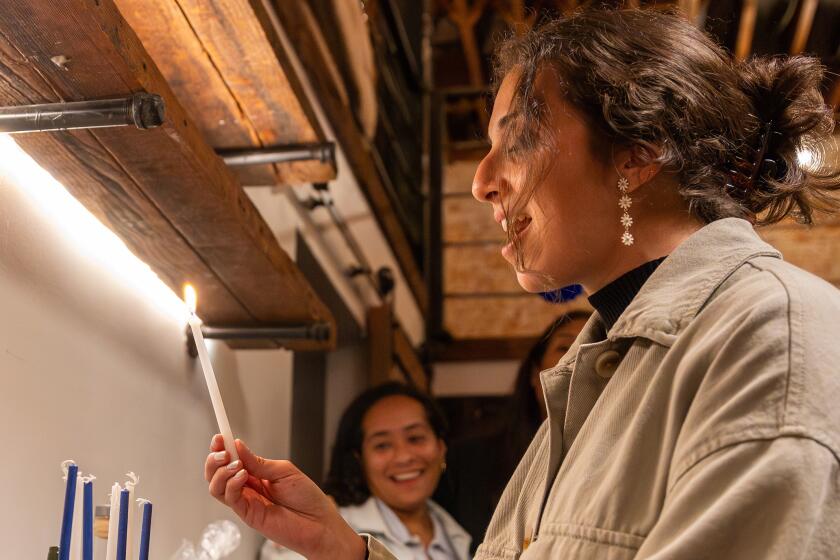
- Share via
I don’t remember believing in Santa Claus growing up. Not in a deep way, at least, like how I believed I could be friends with and maybe kiss Macaulay Culkin and also save him from an untimely bee-related death. I knew, aside from Jesus, Santa was the Christmas guy — the cardinal figure inherent to the holiday who spends his year measuring my behavior to determine whether I was deserving of an Easy-Bake Oven. And it was clear that I was supposed to believe in him, based on everything I saw on TV and in movies.
But for the most part, Santa was wielded as a threatening figure. Si no te portas bien, no te va traer nada! Honestly, not that far from how my mom talked about Jesus and random workers at stores.
So when it came to the jolly one, I had some questions.
How do you compassionately get rid of the things your immigrant parents hold onto that are piling up in their home?
There were clear indicators that the bearded white man in the red suit wasn’t real. To start, gifts were piled up weeks ahead of Christmas in preparation for opening them up at midnight on Nochebuena, so that poked a large hole in his supposed methodology of gift delivery.
The presents sat wrapped in the same paper easily discoverable in the hall closet and, in my mom’s curly writing, the gift tags would say “de Santo Clos.” Sometimes she’d let me open them early, then we’d wrap them again and I was told to act surprised when I opened them in front of everyone — something I learned she used to do with her sister when they were kids.
So yeah, not a lot was done to keep up the illusion, but I played along with the ruse because even at a young age, I loved theatrics and relished the possibility of magical things.
Writing my little letter to Santo Clos and delivering it with an angelic smile and a knowing wink was part of the fun. I never felt like I missed out on anything.
But I’ve wondered if, perhaps, because of our culture, celebratory traditions, and upbringing, Latinos are excluded from believing in Santa.
Like me, Erika Quintana, a librarian in Riverside, never really believed in Santa, for many of the same reasons.
Light blue dreidels, chocolate coin ‘gelt’ and fried churro waffles set the scene at the Ilumnia Jews of Color Hanukkah, part of NuRoots’ Infinite Light Hanukkah festival.
“Santa was kind of like, it sounds bad but, white people stuff,” she said. “I think because my parents made us go to Mass at midnight, at the same time they always say Santa comes, it was like, this is impossible. This doesn’t work. My parents were just not interested in trying to maintain the suspension of belief.”
Her parents, who are first-generation Mexican Americans, instilled in their children early on that if Santa only brings presents for good kids, it implies that those who are poor are bad and undeserving of gifts, and that was not a lesson that they wanted to teach their kids.
“There were other things, I think, that [my mom] felt were more important, stuff she was more interested in passing down than Santa Claus, and she didn’t really grow up with it either,” Quintana said. “I grew up in an area that was 40% Latino, and most of us didn’t necessarily do a lot of Santa stuff, in comparison to my white friends that were all about Santa and big, huge displays of gifts.”
Even so, Quintana never felt shortchanged, and her family made it a point to “be Santa” for others by donating presents to families in need.
I called my mom to get her take. She did grow up believing in Santo Clos until she was about 10, even though she always knew it was her parents, tios, tias and other family members who brought the gifts in Nochebuena. Even so, my grandmother would say “mira lo que te trajo Santo Clos” and no one would question it.
But it’s true that when anyone is determined to get their kids to believe something, any question can be answered. That’s at least true for Jasmine Ontiveros, a claims examiner in Camarillo, who grew up believing in Santa, despite mounting proof against his existence.
Relationships, body image and children: A Latina therapist shares how to handle awkward holiday convos
Questions like “Y el/la novio/a?” or comments about body image can shift the joyful spirit to a hostile environment. Here are some healthy ways to navigate through some touchy subjects.
When Ontiveros asked why there were presents under the tree before Christmas, her parents would say they wrapped empty boxes. When she’d shake the boxes to demonstrate they were not empty, they’d say they filled them with rocks and Santa magically converted them.
“I don’t know if I just chose to be ignorant or chose to believe my parents,” she said. “It was all explained away, so for us, Santa was very much real.”
Giovanni Martinez, a government worker based in Sacramento, also grew up believing in old St. Nick. He was aided by his parents going along with the myth, kids at school and pop culture.
“I definitely had questions when I was younger, but I was too timid to keep asking,” Martinez said. “My mom was pretty good at curving anything. She had some pretty good explanations and I would just take it at face value and be done with it.”
Years later, he recalled a Christmas in which his dad forgot to buy presents. He helped his dad buy presents, including his own, wrapped them, and then had to pretend to be surprised. That, he says, was the final nail in the coffin for Santa.
It seems that, essentially, Santa is as real as we want him to be. Even in the face of evidence, children want to believe, perhaps because of what it means if he’s real, even if for a few short years.
Poinsettias are native to North America, specifically areas of southwestern Mexico and Guatemala, but they are not native to the U.S. despite their popularity.
In a world that can be hard and unjust, it makes sense to turn a blind eye and cling to some whimsy. But, importantly, whether we believed in him or not, or whether he was part of your holidays, Santa was real because of the people who played his role in our lives, if you were so lucky. And that’s worth believing in.
Alex Zaragoza is a television writer and journalist covering culture and identity. Her work has appeared in Vice, NPR, O magazine and Rolling Stone. She’s written on the series “Primo” and “Lopez v. Lopez.” She writes weekly for De Los.
More to Read
The Latinx experience chronicled
Get the Latinx Files newsletter for stories that capture the multitudes within our communities.
You may occasionally receive promotional content from the Los Angeles Times.










